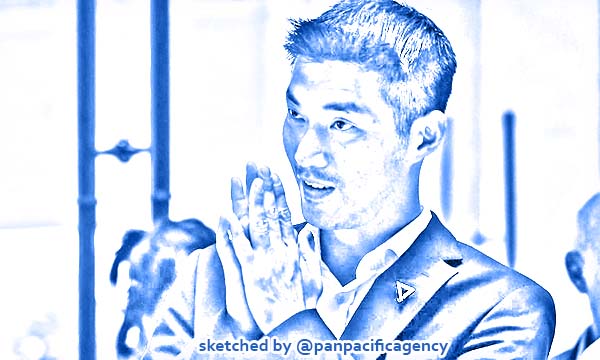[Analytics] Thanathorn’s loss a step back for Thai democracy

Thailand Future Forward Party leader Thanathorn Juangroongruangkit arrives for a joint press conference with other political party leaders in Bangkok in a file photo. Photo: AFP/Lillian Suwanrumpha. Sketched by the Pan Pacific Agency.
Thailand’s Constitutional Court ruled today (November 20) to strip opposition leader Thanathorn Juangroongruangkit of his parliamentary status, a verdict that promises to shake the kingdom’s still delicate transition to democracy after five years of coup-installed military rule. Shawn W. Crispin specially for the Asia Times.
Thanathorn, leader of the anti-military, pro-democracy Future Forward party, was judged to have violated a local law that bars politicians from holding shares in media companies.
The businessman-cum-politician claimed to have transferred his shares in V-Luck Media, a defunct media outfit previously involved in producing glossy magazines for local airlines, well before registering as a candidate for this year’s March 24 general election, as legally required.
The highly anticipated ruling removes Thanathorn’s MP status, which was suspended in May while a court ruling was pending, but significantly does not bar him from serving as his party’s leader or being nominated as a prime minister candidate. He was also spared a possible jail term.
Thanathorn placed second to incumbent military-backed premier Prayut Chan-ocha at a parliamentary vote in May and is widely viewed as de facto leader of the Future Forward and Peua Thai party-led parliamentary opposition.
His ouster from parliament will block him from participating in an upcoming censure debate targeting several of Prayut’s Cabinet ministers, at which his party members will no doubt make the case for a change in government.
There were no immediate signs of street protests soon after the ruling was handed down. Asia Times’ request for comment via Thanathorn’s personal assistant did not receive an immediate reply.
The court’s ruling is likely just the beginning of Thanathorn and his Future Forward party’s legal troubles, with another 21 cases ranging from sedition, computer crimes and threatening the monarchy still under prosecutorial consideration or pending trial. The Election Commission is also pursuing a charge claiming that Thanathorn contributed more than legally allowed to his upstart party.
Any number of those accusations and charges could result in the party’s dissolution and Thanathorn’s permanent ban from politics and even possible imprisonment. At the same time, their removal on perceived as politicized charges would undermine the credibility and legitimacy of Thailand’s military-steered restoration of democracy.
In a recent interview with Asia Times, Thanathorn suggested he and his party are the victims of a political witch hunt led by a conservative and military establishment that seeks to snuff out their drive to demilitarize Thai society and protect democracy from future coups.
His supporters have characterized the mounting number of lawsuits lodged against Thanathorn and his party as “lawfare”, a play on the word “warfare”, which aims to cripple Future Forward’s ability to maneuver and build leverage to pressure its members into more conciliatory, less confrontational positions and tactics.
Thanathorn told Asia Times in an interview before today’s ruling that his party is gaining in popularity, particularly among younger voters, as it makes good on campaign trail vows to challenge the military’s power. That was seen in a recent bill that seeks to end mandatory military conscription and by shining parliamentary light on alleged military abuses.
Thanathorn’s party also recently voted against an emergency decree pushed by Prayut’s government to fold two elite military units into the monarch’s personal guard, a dissenting vote some diplomats and observers viewed as a challenge to royal power, a risky gambit considering the king’s oft-expressed desire for loyalty and stability.
Prayut’s wide-umbrella coalition government is now basking in the afterglow of hosting the Association of Southeast Asian Nations (ASEAN) summit meetings held this month in Bangkok, an occasion Thai officials leveraged to tout the kingdom’s renewed democratic credentials with world leaders in attendance.
The question moving forward is whether that democratic veneer will stand up to outside scrutiny if Thanathorn and his party are eventually banned, a scenario some are already drawing parallels to Cambodian leader Hun Sen’s forced dissolution and persecution of the rival opposition Cambodia National Rescue Party (CNRP).
One Bangkok-based diplomatic source familiar with the situation says that the European Union (EU) has made clear to Thai counterparts that negotiations for a bilateral free trade agreement (FTA) could be complicated or jeopardized by overt political repression of Thanathorn and his party.
Thailand craves an EU agreement to keep pace with Vietnam, which is attracting the region’s lion’s share of investment departing China due to the Sino-US trade war. The EU-Vietnam FTA, via investment-promoting privileges and advantages, gives Vietnam a leg up on Thailand in attracting European investment, significantly at a time many seek to shift their supply chains out of China and into neighboring Southeast Asia.
The EU, US and UN all commended Thailand’s nominal return to democracy after the March 24 polls, even as the result eventually restored coup-maker Prayut to the premiership. Future Forward’s unexpected rise as the third-placing party on an overtly anti-military ticket gave the poll a strong measure of democratic legitimacy, diplomats said at the time.
Asked before today’s ruling how he anticipated the international community, including the US and EU, would respond to his or his party’s ban from politics for perceived as dubious reasons so soon after that electoral result, Thanathorn said he had “no idea” and “I totally don’t know.”
“It’s not about the US [or EU], we’re talking about something very general,” Thanathorn said. “If democracy or human rights are not protected, once people take it for granted, you have Thailand.
“The lesson everywhere in the world is the same. Basically, a threat to democracy anywhere is a threat to democracy everywhere,” he said, waxing both wistful and philosophical.
Editor’s Note: This story will be updated with breaking developments